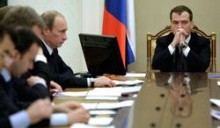Many people in the world have heard about the statements of Russian Federation President Dmitry Medvedev on the necessity to modernize the country. One can recall his call to modernization in the article “Russia, forward!” and his address to the parliament. Previously, Strategy-2020 was approved as a programmatic document of the ruling party, United Russia. Apparently, there are enough documents envisaging country’s development in Russia, but there is still no modernization.
However, Igor Yurgens, head of the Institute of Contemporary Development (ISR), and the economist Evgeny Gontmakher recently drafted and sent to the Russian president a new, 65-page report entitled “Russia of the 20th Century: Image of Desired Tomorrow,” which envisages a cardinal reconstruction of the country to make it a prosperous multiparty democracy in the near future, where mass media would be free from state control. It will be part of NATO (!) and will be considering its entry into the EU.
A noteworthy thing here is that the ISR was established by Medvedev in 2008, when he came to power. It was considered that as a consulting body in the questions of economic policy, this institute would become a key tool in the implementation of his promise to modernize Russia’s economic and political systems.
The authors of the report call on the head of state to return to the four-year-long presidential term and reform the legislation regarding political parties, as well as the laws on elections — reducing the minimum threshold to seven percent, restoring the mixed system of parliamentary elections, abolishing the unfair method of mandate distribution, restoring the rights of the parties to form pre-election blocs, and making access to the registration of lists for elections easier for parties.
Yurgens and Gontmakher also suggest liquidating the Ministry of Internal Affairs. It can be replaced by the Federal Criminal Police Service (FSKP), which will specialize in criminal offences, and municipal police services subordinated to governors and dealing with public security and minor offences.
It is also proposed liquidating the FSB. In its place, the experts suggest establishing the Federal Service of Counterintelligence (FSK) that would have precisely the competence corresponding to its name. Furthermore, another institution that can be set up is the Federal Service on Constitution Protection (FSOK), which would be responsible for “preventing acts of terror, reacting to the threat of separatism, and combating illegal paramilitary groups.”
The authors of the report also hope that the monopoly of the state TV channels and censorship (specifically through business structures connected with the government) will disappear.
In the preface of the report Yurgens and Gontmakher noted that “in the 20 years that have passed since the reforms began, the targets of positive development have only been forecast or have been technocratic. We have been moving ahead, without defining where we are going and what the image of the desired future is.”
Now the authors are calling on the Russian leaders to make a choice: How do they see their country in the future? What are they ready to do in order not to miss their historical chance? After the report was presented, Yurgens stated before journalists that he had “great hopes” that Medvedev is precisely the person who is able to introduce these changes.
Yurgens and Gontmakher believe that the country stands a chance of being modernized, in spite of the fact that Russia’s new “modernization breakthrough” has to be performed under conditions when “many things are conducive to inertia and rotting” — “from the state of affairs in the raw material markets to the sentiments in political circles, as well as the government’s confidence in its ability to rule the mass consciousness.”








